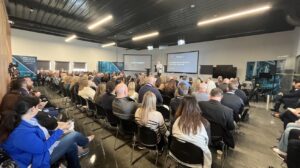As an AI technology business, it’s important to recognize those who have come before us and how they have changed the way we work and live. When we use a doorbell camera, navigate backroads using GPS, or speak to a friend through our computer, we rarely pause to give credit to the innovating minds that enabled such opportunities. In fact, some of the major technology breakthroughs in computer science, engineering, aviation, space exploration, video games, etc., came from the skill, creativity, and perseverance of black men and women solving problems that had never been solved before.
Their legacy continues today as black tech innovators help bring forth AI-enabled breakthroughs that will augment human intelligence in the 21st century and beyond. In celebration of Black History Month, we share black pioneers of the tech industry who have led and continue to lead the way for future generations.
Early pioneers
Marie Van Brittan Brown
 Thanks to inventor Marie Van Brittain Brown, millions of homes are protected by systems like Ring and ADT. Brown was the first to devise a system that used a camera to screen for unwanted guests. Using the simple technology at her disposal, she used peepholes she built in her walls to have visitors projected onto a monitor. Several unique elements of her design are incorporated into today’s systems and have become the standard in security system technology.
Thanks to inventor Marie Van Brittain Brown, millions of homes are protected by systems like Ring and ADT. Brown was the first to devise a system that used a camera to screen for unwanted guests. Using the simple technology at her disposal, she used peepholes she built in her walls to have visitors projected onto a monitor. Several unique elements of her design are incorporated into today’s systems and have become the standard in security system technology.
Roy Clay
 The “Godfather of Silicon Valley,” Roy Clay Sr., was an African American technological pioneer who created game-changing computer software years before Steve Jobs and Bill Gates. During the civil rights era, he started coding in Fortran. He contributed to HP’s success by writing the software for their first computer, the 2116A. Clay founded Rod-L Electronics in the 1970s, the first technology start-up in Silicon Valley. Having played a major role in the development of Silicon Valley, he was inducted into their Engineer Council’s Hall of Fame in 2003.
The “Godfather of Silicon Valley,” Roy Clay Sr., was an African American technological pioneer who created game-changing computer software years before Steve Jobs and Bill Gates. During the civil rights era, he started coding in Fortran. He contributed to HP’s success by writing the software for their first computer, the 2116A. Clay founded Rod-L Electronics in the 1970s, the first technology start-up in Silicon Valley. Having played a major role in the development of Silicon Valley, he was inducted into their Engineer Council’s Hall of Fame in 2003.
Mark Dean
 Computer scientist and engineer Mark Dean worked with IBM to develop the first gigahertz chip and the color PC monitor. He holds three of IBM’s original nine patents. His work forever changed the usability of the personal computer with collaborative inventions like the Industry Standard Architecture (ISA) system bus for computer plug-ins. Dean is the first African-American to become an IBM Fellow, the highest level of technical excellence at the company. He was inducted into the National Inventors Hall of Fame in 1997, and in 2001, he received membership to the National Academy of Engineers.
Computer scientist and engineer Mark Dean worked with IBM to develop the first gigahertz chip and the color PC monitor. He holds three of IBM’s original nine patents. His work forever changed the usability of the personal computer with collaborative inventions like the Industry Standard Architecture (ISA) system bus for computer plug-ins. Dean is the first African-American to become an IBM Fellow, the highest level of technical excellence at the company. He was inducted into the National Inventors Hall of Fame in 1997, and in 2001, he received membership to the National Academy of Engineers.
Katherine Johnson
 Katherine Johnson will always be remembered for her orbital mechanic calculations as a mathematician at NASA. These efforts were crucial to the success of the first and subsequent U.S. crewed spaceflights. You may know her from the book or major motion picture “Hidden Figures.” The Katherine G. Johnson Computational Research Facility at NASA honors her contributions. President Barack Obama awarded Katherine the Presidential Medal of Freedom in 2015.
Katherine Johnson will always be remembered for her orbital mechanic calculations as a mathematician at NASA. These efforts were crucial to the success of the first and subsequent U.S. crewed spaceflights. You may know her from the book or major motion picture “Hidden Figures.” The Katherine G. Johnson Computational Research Facility at NASA honors her contributions. President Barack Obama awarded Katherine the Presidential Medal of Freedom in 2015.
Dr. Gladys West
 Dr. Gladys West began her career by performing complex mathematic calculations by hand before the computer age. Her greatest accomplishment was creating an extremely detailed geodetic model of the Earth, which became the foundation for the Global Positioning System (GPS). West was inducted into the United States Air Force hall of fame for her contributions, cementing her place in history and paving the way for young black women wanting to work in technology.
Dr. Gladys West began her career by performing complex mathematic calculations by hand before the computer age. Her greatest accomplishment was creating an extremely detailed geodetic model of the Earth, which became the foundation for the Global Positioning System (GPS). West was inducted into the United States Air Force hall of fame for her contributions, cementing her place in history and paving the way for young black women wanting to work in technology.
Gerald “Jerry” Lawson
 In the mid-70s, Jerry Lawson, a self-taught engineer, helped change the gaming industry forever. As the head of engineering and marketing for Fairchild Semiconductor’s gaming outfit, Lawson created the first home gaming console with interchangeable cartridges. While Lawson’s gaming system was not as successful as those that followed it (like Nintendo and Sega), his design changed gaming from single games saved on the hardware to multiple games that could swap out.
In the mid-70s, Jerry Lawson, a self-taught engineer, helped change the gaming industry forever. As the head of engineering and marketing for Fairchild Semiconductor’s gaming outfit, Lawson created the first home gaming console with interchangeable cartridges. While Lawson’s gaming system was not as successful as those that followed it (like Nintendo and Sega), his design changed gaming from single games saved on the hardware to multiple games that could swap out.
Walter Braithwaite
 Commercial airlines used hand-drafted documents to develop aircraft before the 1970s, which was costly, labor-intensive, and error-prone. That all changed when Walter Braithwaite joined Boeing’s Fabrication Division as an associate tool engineer. After nearly a decade, he became the senior engineer responsible for developing Boeing’s computer-aided technology in designing commercial airplanes. His leadership and use of CAD technology were deployed to create the 707, 727, 737, 747, 757, and eventually “Triple Seven” 777, the first commercial aircraft to be entirely digitally designed. In 1991, Walter became VP of information systems and architecture at Boeing and held various high-ranking executive roles. After 36 years with Boeing, he retired in 2003.
Commercial airlines used hand-drafted documents to develop aircraft before the 1970s, which was costly, labor-intensive, and error-prone. That all changed when Walter Braithwaite joined Boeing’s Fabrication Division as an associate tool engineer. After nearly a decade, he became the senior engineer responsible for developing Boeing’s computer-aided technology in designing commercial airplanes. His leadership and use of CAD technology were deployed to create the 707, 727, 737, 747, 757, and eventually “Triple Seven” 777, the first commercial aircraft to be entirely digitally designed. In 1991, Walter became VP of information systems and architecture at Boeing and held various high-ranking executive roles. After 36 years with Boeing, he retired in 2003.
Evelyn Boyd Granville
 Dr. Evelyn Granville is the second African American woman to earn a Ph.D. in Mathematics, which she completed at Yale University in New Haven, Connecticut, in 1949. She earned a double Master’s Degree in Mathematics and Physics in only one year at Yale. Granville worked at IBM on the Project Vanguard and Project Mercury space programs. The space and information systems division of North American Aviation employed her as a research specialist for the Apollo program, where she worked on celestial mechanics, trajectory and orbit computation, numerical analysis, and digital computer techniques.
Dr. Evelyn Granville is the second African American woman to earn a Ph.D. in Mathematics, which she completed at Yale University in New Haven, Connecticut, in 1949. She earned a double Master’s Degree in Mathematics and Physics in only one year at Yale. Granville worked at IBM on the Project Vanguard and Project Mercury space programs. The space and information systems division of North American Aviation employed her as a research specialist for the Apollo program, where she worked on celestial mechanics, trajectory and orbit computation, numerical analysis, and digital computer techniques.
Lucean Headen
 Lucean Headen was one of the first black aviators. He was also an inventor, developing a cloaking device for ships that chased U-boats during World War I. Headen had a fascination for automobiles, leading to the production of the Headen Pace Setter, a car with double the horsepower of Ford’s Model T. At 52 years old, he moved to England and started an engineering firm. He lived in a township called Frimley Green until he passed away in 1957. Headen’s aeronautical patents, including de-icing aircraft wings and propellers, are still cited for modern airplane equipment today.
Lucean Headen was one of the first black aviators. He was also an inventor, developing a cloaking device for ships that chased U-boats during World War I. Headen had a fascination for automobiles, leading to the production of the Headen Pace Setter, a car with double the horsepower of Ford’s Model T. At 52 years old, he moved to England and started an engineering firm. He lived in a township called Frimley Green until he passed away in 1957. Headen’s aeronautical patents, including de-icing aircraft wings and propellers, are still cited for modern airplane equipment today.
Mariam Croak
 Dr. Miriam Croak attended Princeton University for her undergraduate studies and earned a Ph.D. in quantitative analysis from the University of Southern California. With over 200 patents to her credit, Croak is one of the world’s leading innovators in voice and data communications. One of her most significant accomplishments was the development of Voice Over Internet Protocols (VoIP), technology that enables you to make a call directly from a computer or other digital device by converting your voice into a digital signal. As the VP of engineering at Google, Marian expands internet capabilities globally with a focus on responsible and sustainable development.
Dr. Miriam Croak attended Princeton University for her undergraduate studies and earned a Ph.D. in quantitative analysis from the University of Southern California. With over 200 patents to her credit, Croak is one of the world’s leading innovators in voice and data communications. One of her most significant accomplishments was the development of Voice Over Internet Protocols (VoIP), technology that enables you to make a call directly from a computer or other digital device by converting your voice into a digital signal. As the VP of engineering at Google, Marian expands internet capabilities globally with a focus on responsible and sustainable development.
Present-day trailblazers
In keeping with the example set by these early pioneers, these remarkable people are blazing new paths and making their mark in technology today:
Joy Buolamwini
 Joy Boulamwini, a computer scientist, is passionate about digital equity. Her TED talk on algorithmic bias has over 1 million views. She established the Algorithmic Justice League to expose and eliminate digital racial bias in artificial intelligence systems that impact corporate culture and behavior in the tech sector. Joy’s MIT thesis methodology uncovered large racial and gender bias in AI services from companies like IBM, Amazon, and Microsoft. Her research has been covered in over 40 countries, and she has advocated for algorithmic justice at the World Economic Forum and the UN. Boulamwini was featured on Forbes 30 under 30 in 2019 and has been recognized as one of the world’s Top 50 Women in Tech.
Joy Boulamwini, a computer scientist, is passionate about digital equity. Her TED talk on algorithmic bias has over 1 million views. She established the Algorithmic Justice League to expose and eliminate digital racial bias in artificial intelligence systems that impact corporate culture and behavior in the tech sector. Joy’s MIT thesis methodology uncovered large racial and gender bias in AI services from companies like IBM, Amazon, and Microsoft. Her research has been covered in over 40 countries, and she has advocated for algorithmic justice at the World Economic Forum and the UN. Boulamwini was featured on Forbes 30 under 30 in 2019 and has been recognized as one of the world’s Top 50 Women in Tech.
Herman Chinery-Hesse
 Herman Chinery-Hesse, known as the “Bill Gates of Ghana,” is the founder of SOFTtribe, the largest software company in Ghana. SOFTtribe is regarded as one of Africa’s Top 20 technology influences providing services to a customer base including Nestle, Guinness, and Unilever. In 2019, Chinery-Hesse was installed as the Commonwealth Chair for Business and Technology Initiatives for Africa.
Herman Chinery-Hesse, known as the “Bill Gates of Ghana,” is the founder of SOFTtribe, the largest software company in Ghana. SOFTtribe is regarded as one of Africa’s Top 20 technology influences providing services to a customer base including Nestle, Guinness, and Unilever. In 2019, Chinery-Hesse was installed as the Commonwealth Chair for Business and Technology Initiatives for Africa.
Rediet Abebe
 Rediet Abebe is the Assistant Professor of Computer Science at the University of California, Berkeley, and a Junior Fellow at the Harvard Society of Fellows. Abebe’s research focuses on algorithms and artificial intelligence, with a particular emphasis on inequality and distributive justice issues. She is the co-founder of Black in AI, working to increase the presence of Black people in the field of artificial intelligence.
Rediet Abebe is the Assistant Professor of Computer Science at the University of California, Berkeley, and a Junior Fellow at the Harvard Society of Fellows. Abebe’s research focuses on algorithms and artificial intelligence, with a particular emphasis on inequality and distributive justice issues. She is the co-founder of Black in AI, working to increase the presence of Black people in the field of artificial intelligence.
Mutale Nkonde
 AI policy analyst and researcher Mutale Nkonde got her start as a journalist in New York City. Working as a senior tech policy advisor for Congresswoman Yvette Clarke, Nkonde was part of the team that helped introduce the Algorithmic Accountability Act into the House of Representatives in April 2019. As founder of AI for the People, Mutale Nkonde uses art and culture to empower general audiences to combat racial bias in AI policy and technology.
AI policy analyst and researcher Mutale Nkonde got her start as a journalist in New York City. Working as a senior tech policy advisor for Congresswoman Yvette Clarke, Nkonde was part of the team that helped introduce the Algorithmic Accountability Act into the House of Representatives in April 2019. As founder of AI for the People, Mutale Nkonde uses art and culture to empower general audiences to combat racial bias in AI policy and technology.
Marques Brownlee
 Marques Brownlee joined YouTube at 15 to focus on consumer electronics reviews. His first YouTube video broke down the inner workings of an HP Pavilion laptop he purchased with his saved allowance. He maintained his channel while earning a degree in Business and Technology at Stevens Institute of Technology. Brownlee’s channel, MKBHD, is one of the most popular technology channels on YouTube, with over 16 million subscribers. Marques has interviewed tech moguls like Elon Musk, Bill Gates, and Mark Zuckerberg. Tesla selected Brownlee’s video as the winner of a nationwide contest to promote Tesla’s Model S electric car.
Marques Brownlee joined YouTube at 15 to focus on consumer electronics reviews. His first YouTube video broke down the inner workings of an HP Pavilion laptop he purchased with his saved allowance. He maintained his channel while earning a degree in Business and Technology at Stevens Institute of Technology. Brownlee’s channel, MKBHD, is one of the most popular technology channels on YouTube, with over 16 million subscribers. Marques has interviewed tech moguls like Elon Musk, Bill Gates, and Mark Zuckerberg. Tesla selected Brownlee’s video as the winner of a nationwide contest to promote Tesla’s Model S electric car.
Kimberly Bryant
 Over the course of her career as an Engineering Manager, Kimberly Bryant has held various technical leadership roles for various Fortune 100 companies, including Genentech, Merck, and Pfizer. Noticing the lack of access to opportunities in the tech space for young girls of color, Bryant founded Black Girls Code in 2011. The program teaches computer programming to school-age girls in after-school and summer programs with the goal of educating one million black girls by 2040.
Over the course of her career as an Engineering Manager, Kimberly Bryant has held various technical leadership roles for various Fortune 100 companies, including Genentech, Merck, and Pfizer. Noticing the lack of access to opportunities in the tech space for young girls of color, Bryant founded Black Girls Code in 2011. The program teaches computer programming to school-age girls in after-school and summer programs with the goal of educating one million black girls by 2040.
Charley Moore
 Charley is the Founder and CEO of the online legal services platform Rocket Lawyer, which provides affordable and simple solutions for nearly any legal situation. Before Rocket Lawyer, Moore practiced as an attorney for Venture Law Group. He completed his Juris Doctorate at the University of California, Berkeley, and served as a U.S. Naval Officer in the Gulf War.
Charley is the Founder and CEO of the online legal services platform Rocket Lawyer, which provides affordable and simple solutions for nearly any legal situation. Before Rocket Lawyer, Moore practiced as an attorney for Venture Law Group. He completed his Juris Doctorate at the University of California, Berkeley, and served as a U.S. Naval Officer in the Gulf War.
Tope Awotona
 Tope Awotona is the CEO of Calendly. He launched Calendly using funds from his 401(k) and has been outspoken about his difficulty raising VC funding. Tope overcame challenges to build a business worth over $50 million in annual revenue without funding. His story serves as an important example of making venture funding more equitable.
Tope Awotona is the CEO of Calendly. He launched Calendly using funds from his 401(k) and has been outspoken about his difficulty raising VC funding. Tope overcame challenges to build a business worth over $50 million in annual revenue without funding. His story serves as an important example of making venture funding more equitable.
At SparkCognition, we are proud to continue in the tradition of those who forged the way in AI and technology. And we’re excited about the future as we pursue our mission to deliver world-class AI solutions that allow organizations to solve their most critical problems, empowering them to run a more sustainable, safer, and profitable business. Learn more about the technology behind our award-winning solutions here.
















